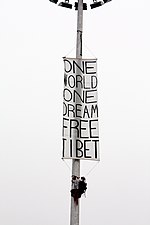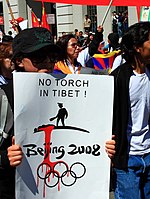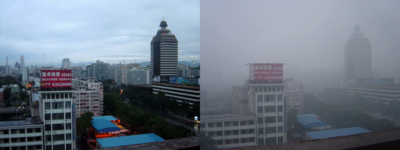Concerns and controversies at the 2008 Summer Olympics
Other controversies surrounding the 2008 Summer Olympics included ticketing problems, displacement of Beijing residents due to construction and demolitions, and alleged persecution of individuals applying to protest.Outside the capital, cities hosting Olympic events were patrolled by 34,000 troops, surface-to-air missiles guarded key sites, and 74 military aircraft, 48 helicopters, and 33 naval vessels were placed on high alert.[19] Hong Kong's South China Morning Post (SCMP) reported that bar owners in the Sanlitun district of Beijing were ordered by police officials not to serve "black people or Mongolians" as well as, in one case, to lay off two staff members who were ethnic Tibetan[20] for the Olympics.[49] The athletes, dressed in uniform and assembled at a center court bearing a dragon logo, posed with their hands pulling back the skin on their eyes.[50] Point guard Jose Manuel Calderon said the team was responding to a request from the photographer, while teammate Pau Gasol said it was "absurd" people were calling the gesture racist.[77] Having been satisfied with the proof of age received from the Chinese Gymnastics Association, the FIG ended the investigation on 1 October 2008, concluding that He and her teammates were eligible to compete.[81] His victory in Athens four years ago was China's first gold medal in track and field, regarded by some as dispelling the widespread view that Chinese physiology was unsuitable for such a discipline.Hyped by the state and sponsors, with his fame and endorsements exceeding that of Yao Ming in China, Liu's withdrawal disappointed millions with some accusing him of being afraid to lose,[82][83] while others suggested that excessive pressure may have worn him out.While Yang and his family have received numerous rewards for his achievement (including white collar jobs, stipends, performance bonuses, endorsements, and an apartment), he has not seen his parents in three years.[93] 2008 Summer Olympics migrant workers routinely endured dangerous work environments and lacked any safety net, including medical and accident insurance.[94] Calls for sustained pressure and boycotts of the Olympics came from former French presidential candidate François Bayrou,[95] Sudan scholar Eric Reeves[96] and the editorial board of The Washington Post.[citation needed] Additionally, 106 lawmakers in the United States circulated a letter calling for the US to boycott the Olympics because of China's support of the Sudanese regime[99] and the forced relocation of 300,000 poor Chinese[100] to make room for the games.[101] Polish prime minister Donald Tusk, became the first EU head of government to announce a boycott and was soon joined by President Václav Klaus of the Czech Republic.[100] Protester Ye Guozhu, who attempted to draw public attention to alleged forced evictions in Beijing due to Olympics-related construction, was sentenced in December 2004 to a four-year prison term for "picking quarrels and stirring up trouble".On 2 April 2008, the Japanese government announced that its royal family would not participate in the opening ceremony because of the international concern focused on the violent crackdown in Tibet.[116] The international journalist group Reporters Without Borders (RSF) advocated boycott to express concerns over violations of free speech and human rights in China.[119] During the Olympic torch lighting ceremony in Greece on 24 March 2008, three Reporters Without Borders journalists breached a cordon of 1,000 police at the ancient Olympia stadium and interrupted the speech of Liu Qi, head of the Beijing Games committee.[121] Nearly 50 Tibetan exiles in India began a global torch relay 25 March 2008 with a symbolic "Olympic" flame that ended in Tibet on 8 August 2008, the day of the Summer Games' opening ceremonies in Beijing.In late April, Chinese Internet censors, who had previously permitted posts critical of non-Chinese, began blocking words such as "Carrefour", in what was seen as an attempt to calm tensions before the games.[151] In late July, US senator Sam Brownback alleged that foreign-owned hotels in China were ordered by the government to install equipment to monitor internet use by guests.[163][164] After the games had closed, the Foreign Correspondents Club of China (FCCC) issued a statement noting that there was "welcome progress in terms of accessibility and the number of press conferences within the Olympic facilities".[179] In the aftermath of the Weng'an riot, which was incited by the rape and murder of a teenage girl, photographs as well as comments on the Guizhou protest in chatrooms and forums were quickly deleted by the mainland Internet censors.Marco Cardinale of the British Olympic Association has stated that air pollution coupled with heat and humidity makes it "very unlikely we'll see outstanding performances in endurance sports.[189] Nevertheless, the IOC's medical commission analysed air-quality data recorded by the Beijing Environment Protection Bureau in August, when test athletic events were held in the Chinese capital.[184] The pollution prompted several athletes to change events or opt out: for example, Ethiopian long-distance runner Haile Gebrselassie withdrew from the marathon and ran the 10,000 meters instead, to reduce the risk of harm to himself because of his asthma,[192] and Belgian tennis player Justine Henin announced nearly a year before the games that she would not compete for the same reasons.[193] In July 2008, stricter emergency pollution controls were introduced, including suspending production at more factories and coal-fired power plants, lowering the number of cars on the road and expanding driving restrictions to nearby Tianjin.[196] Despite the program, by 28 July the China Daily reported that Beijing's skies remained alarmingly polluted and that authorities were considering emergency measures during the Games.However, a 28 July 2008 Greenpeace report stated that average concentration of atmospheric particulate matter in Beijing was still twice the levels the World Health Organization considers safe.The number of tourists attending the Beijing games was lower than expected, and many migrant workers, ethnic minorities, and political dissidents had left the city as a result of intimidation or official requests.[220][221] Hoteliers blamed the lack of visitors on increased security measures and the tightening of visa rules and for driving out thousands of itinerant foreigners and overseas students living in Beijing.







2008 Summer OlympicsBid processbid detailsVenuesMarketingmascotsBroadcastersTorch relayOpening ceremonyflag bearersMedal tablemedalistsClosing ceremonyChronological summaryWorld and Olympic recordsParalympicsSF&OCHKDarfur conflictMyanmarXinjiangpollutionOlympic bidgymnasticsPeople's Armed PoliceThe Timessurface-to-air missilesSouth China Morning PostSanlitunTime magazineXinhuaincorrect English translations2008 Summer Olympics opening ceremonyBishopJohn Tong HonCardinal ZenOde to the MotherlandPolitburoBeijing National StadiumChinese men's football teamBelgiumTan WangsongSébastien PocognoliZheng ZhiMohammad AlirezaeiIsraelTom Be'eri100 meter breaststrokepolitical reasonsAra Abrahamian84 kg Greco-Roman wrestlingtaekwondoÁngel Valodia MatosWorld Taekwondo Federationweaker opponentChinese competitorDiario MarcaThe GuardianJose Manuel CalderonPau GasolFC Schalke 04SV Werder BremenFC BarcelonaCourt of Arbitration for SportBrazil'sRafinhaArgentina'sLionel MessiBrazilian Football ConfederationAge requirements in gymnasticsYang Yun2000 Summer OlympicsDong FangxiaoInternational Federation of GymnasticsJiang YuyuanHe KexinYang YilinInternational Olympic CommitteeJacques Roggefamily booksLiu Xiang110 meter hurdlesYao MingYang WenjunThe New York TimesCheng Fei2002 Asian Games2004 Summer OlympicserythropoietinInternational Labour Organizationmigrant workersSteven SpielbergFrançois BayrouThe Washington PostEdward McMillan-ScottPrince of WalesJohn McCainBarack ObamaDonald TuskVáclav KlausAngela MerkelCentre on Housing Rights and EvictionsForeign Ministryforced evictionspicking quarrels and stirring up troubleBritish Olympic AssociationLe MondeFrench PresidentNicolas SarkozyDalai Lama2008 Xinjiang attackUyghur separatistsInterpolhand grenadesKashgar2008 Tibetan unrestTibetan independence movementOlympic Torch Relaypro-Tibetan independenceStudents for a Free TibetTibetan antelopeRichard GereInternational Campaign for Tibettheir own version of the OlympicsReporters Without Bordersprisoners of consciencepromises made to the IOC
